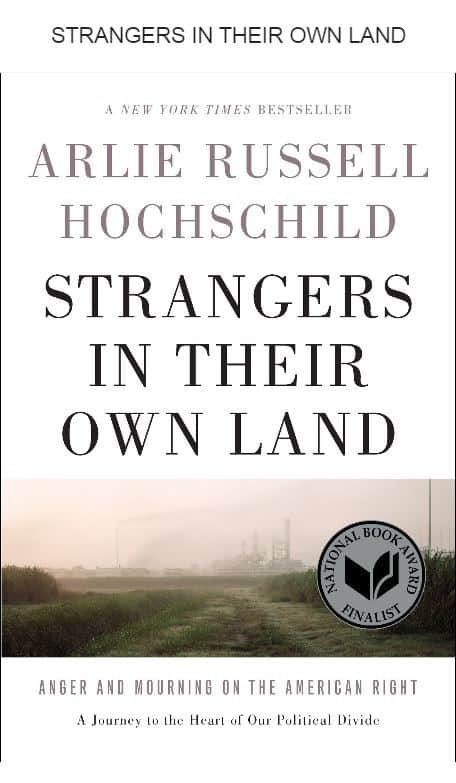By Jim Heffernan
This is Arlie Hochshcild’s 9th and latest book. It was a finalist for a National Book Award. It the result of 5 years research in rural Louisiana into the “deep story” of working class people who are sympathetic to Tea Party beliefs. When she’s not writing or researching, she’s a Professor of Sociology at University of California at Berkeley.
“Deep story” was not a term I was familiar with but I think it is a valuable concept if we wish to understand others. Our deep story is the story we create out of our feelings. It’s a story which feels as if it’s true. It’s a story that plays out in scenes and we cling to it fiercely.
She explains the deep story of Tea Party people, and perhaps a lot more of us, with a metaphor about standing in the middle of a long line on a stairway that climbs a long hill. You’re in the middle of the line and at the top of the hill lies the American dream, complete with nice house, new car, fancy boat and money in the bank. You’re angry and impatient because the line’s not moving. Actually the line ahead seems to be getting longer. It’s not your fault, you’ve worked hard and paid taxes all your life. It must be undeserving people cutting in line in front of you that explains your lack of progress. The undeserving who are keeping you moving up the line must be getting help from somebody. That somebody must be a illegitimate government that conspires against you.
The area she chooses to explore is the bayou country around Lake Charles, Louisiana. The people she chooses are working class whites who have lived in this area for generations. Historically, the bayou country was once something of a paradise with plentiful fish and game and statuesque cypress forests. The nights were filled with the music of millions of singing frogs. By the time of the book, the oil and chemical industries have brought good jobs to the area, but now the fish are not safe to eat because they are tainted with mercury and worse, the once-majestic cypress are dead, and the frogs are gone.
Here she introduces another important term, the “great paradox” of people who have suffered the most from environmental damage being the people who are most opposed to government regulation.
It would be hard to find another area of the country that has suffered as much as the bayou country of Texas/Louisiana. Some call it “cancer alley”. I think it would also be hard to find an area where regulation is more bitterly opposed.
She introduces two other terms that I found fascinating, “empathy wall” and “structural amnesia”. “Empathy wall” refers to an emotional barrier that separates into “us” and “them”. Understanding will always evade us until we can truly see throug another’s eyes. “Structural amnesia” is the ability of society to forget that which is unpleasant. Good examples are memories of our treatment of indigenous people and of our damage to our bayous, prairies and forests. If we don’t remember, it’s as if they never happened
Arlie writes with a well-polished style that avoids the usual jargon of sociologists and provides us with a warm human look at the people of the bayou country. I highly recommend the book.
As always, I welcome further discussion at codger817@gmail.com. Below are some excerpts I enjoyed.
Page 12
“A Lake Charles-based artist, Sally was a progressive Democrat who in 2016 primary favored Bernie Sanders. Sally’s very dear friend and world-traveling flight attendant from Opelousas, Louisiana, Shirley was an enthusiast for the Tea Party and Donald Trump. Both woman had joined sororities at LSU. Each had married, had three children, lived in homes walking distance apart in Lake Charles, and had keys to each other’s houses. Each loved the other’s children. ……………………………………Both women followed the news on TV–Sally through MSNBC’s Rachel Maddow, and Shirley via Fox News’s Charles Krauthammer, and each talked these different reports over with a like-minded husband. The two women talk by phone two or three times a week, and their grown children keep in touch, partly across the same political divide. While this book is not about the personal lives of these two women, it couldn’t have been written without them both, and I believe that their friendship models what our country itself needs to forge: the capacity to connect across difference.”
Page 8
A great paradox…red states are poorer and have more teen mothers, more divorce, worse health, more obesity, more trauma-related deaths, more low-birth-weight babies, and lower school enrollment….The gap in life expectancy between Louisiana (75.7) and Connecticut (80.8) is the same as that between the U.S. and Nicaragua….And the problem transcends race; an average black in Maryland lives four years longer, earns twice as much, and is twice as likely to have a college degree as a black in Louisiana. And whites in Louisiana are worse off than whites in Maryland or anywhere else outside Mississippi. Louisiana has suffered many environmental problems too: there are nearly 400 miles of low, flat, subsiding coastline, and the state loses a football field-size patch of wetland every hour. It is threatened by rising sea levels and severe hurricanes, which the world’s top scientists connect to climate change.”
Page 226
“Seen through Durkheim’s eyes, the real function of the excited gathering around Donald Trump is to unify all the white, evangelical enthusiasts who fear that those “cutting ahead in line” are about to become a terrible, strange, new America. The source of the awe and excitement isn’t simply Trump himself; it is the unity of the great crowd of strangers gathered around him. If the rally itself could speak, it would say, “We are a majority!”
400 pages (134 notes, index,etc.) Published Feb. 20, 2018 Goodreads 4.2 of 5 stars average (15,669 ratings) Available Cloud and Leaf Bookstore in Manzanita, Tillamook Public Library, and most other booksellers.


